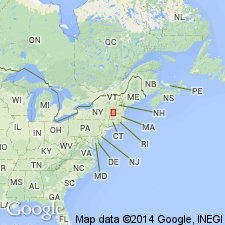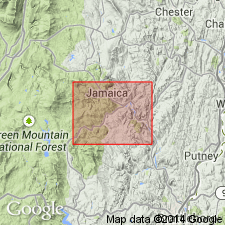
- Usage in publication:
-
- College Hill Granite Gneiss*
- Modifications:
-
- Named
- Dominant lithology:
-
- Granite
- Gneiss
- AAPG geologic province:
-
- New England province
Summary:
Named as part of Mount Holly Complex. Named for excellent exposures on College Hill, Jamaica quad, Windham Co., south-central VT. Forms northeast- to east-west-trending, arcuate outcrop belt 20 km long and up to 1.5 mi wide. Exposed in Stratton Mountain, Peru, and Jamaica, VT quads. Consists of coarse-grained, microcline-megacrystic granitic gneiss and deformed gneissic granite at type locality. Differs from other granitic gneisses in southern VT by its much coarser grain size and absence of ghostlike inherited fabric present in other unnamed units. Resembles Tyringham Gneiss of Berkshire massif in MA (Ratcliffe and Zartman, 1976) in texture and appearance. Mantled with gradational contact to the north and south by a sheath of light-pinkish-green to gray biotite-microcline migmatitic granitic gneiss, not included in College Hill Granite Gneiss. Sheath is widest where College Hill Granite Gneiss is widest, and narrows near tapering ends of College Hill unit. On north and south slopes of College Hill, grades outward into migmatite over distance of 100 m. Crosscut by small irregular pods, stringers, and segregations of pegmatitic granite, indicating high-grade dynamothermal metamorphism after intrusion. Age is Middle Proterozoic.
Source: GNU records (USGS DDS-6; Reston GNULEX).

- Usage in publication:
-
- College Hill Granite Gneiss*
- Modifications:
-
- Geochronologic dating
- AAPG geologic province:
-
- New England province
Summary:
Cores of abraded zircon obtained from College Hill Granite Gneiss of Mount Holly Complex have a U-Pb upper intercept age of 1245 +/-14 Ma, interpreted as crystallization age for that granite (Aleinikoff and others, 1990). Dust collected by abrasion of zircons, though to represent migmatitic overgrowth, has a Pb-Pb age of approx 1100 Ma. These data suggest that College Hill Granite Gneiss was intruded at 1245 Ma and migmatized at 1100 Ma. On north and south slopes of College Hill, College Hill Granite Gneiss grades outward into migmatitic biotite granite gneiss of Mount Holly Complex. College Hill is discordant to contacts and folds in paragneiss units of Mount Holly Complex.
Source: GNU records (USGS DDS-6; Reston GNULEX).
For more information, please contact Nancy Stamm, Geologic Names Committee Secretary.
Asterisk (*) indicates published by U.S. Geological Survey authors.
"No current usage" (†) implies that a name has been abandoned or has fallen into disuse. Former usage and, if known, replacement name given in parentheses ( ).
Slash (/) indicates name conflicts with nomenclatural guidelines (CSN, 1933; ACSN, 1961, 1970; NACSN, 1983, 2005, 2021). May be explained within brackets ([ ]).

